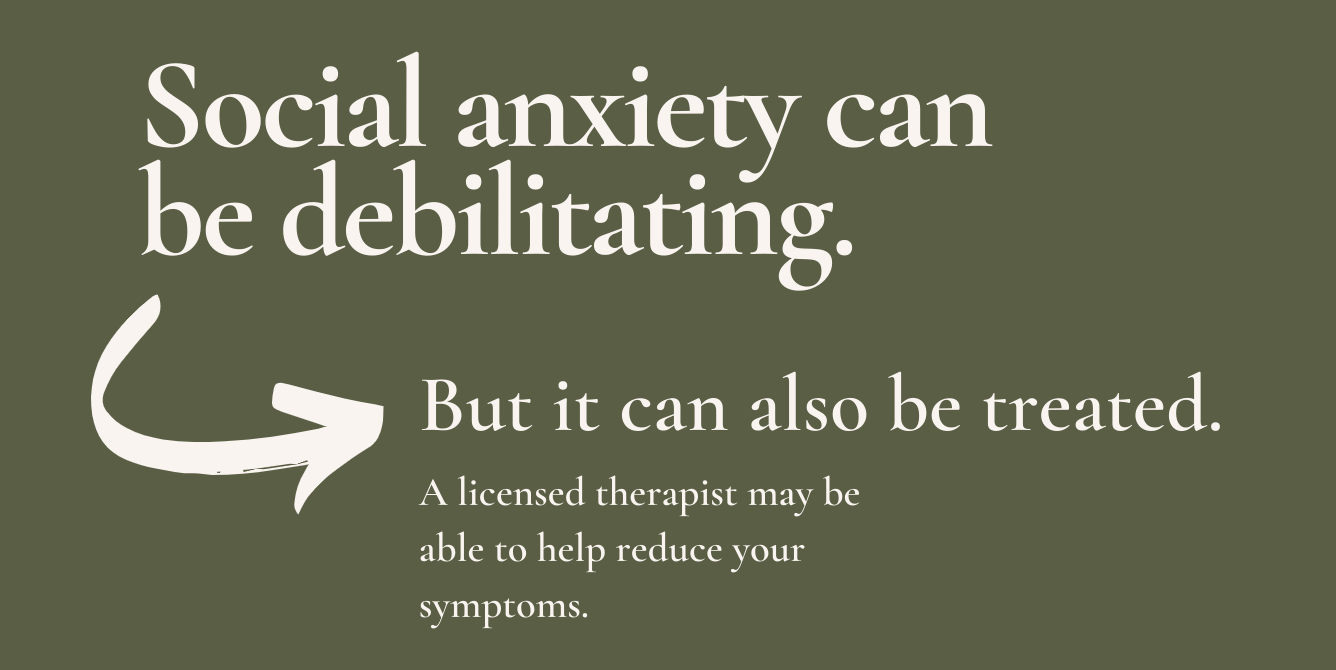How to Express Romantic Love: Effective and Heartfelt Gestures
All the world celebrates romantic love, and people from all walks of life look for ordinary moments and extraordinary ones to express love to their...
5 min read
![]() Williamsburg Therapy Group
:
Feb 27, 2023 10:51:03 AM
Williamsburg Therapy Group
:
Feb 27, 2023 10:51:03 AM

It's one of the most visceral shifts in the human experience.
You're at a friend's apartment, having a good time. Talking, laughing, sharing jokes. Everything is fine. You feel relaxed and proud of yourself for seeming so charismatic and outgoing.
But then the door opens and a new person comes in—one you haven't seen or met before. Your heart sinks, and your palms become sweaty. Your humor is gone, and your mouth dries out.
You hide it, but ultimately the fun of the night has evaporated in the face of interacting with a new person. Will they like you? Will they find you interesting? Will your friends notice how quiet you're being now?
If that scene sounds familiar, there's a chance you have a form of social anxiety. The good news is that you're not alone: Social anxiety disorder is an extremely common condition that affects about one in ten people.
That means if you're at a party with 20 people, there's a really good chance you're not the only one freaking out. It also means there are treatments—CBT, for example—for social anxiety disorder that have been well-studied and may be able to help you feel better at your next outing.
Let's explore CBT for social anxiety disorder.
Skip to your question:
What causes social anxiety disorder?
Is CBT the best therapy for social anxiety?
What is the success rate of CBT for social anxiety?
How long does it take for CBT to work for social anxiety?
Williamsburg Therapy Group: CBT for Social Anxiety in Austin
Genetics, negative or traumatic experiences, and changing social and work structures can all cause, or contribute to causing, social anxiety.
The reality is that your case of social anxiety is likely caused by a combination of factors. You might have a genetic predisposition to anxiety in general, which is compounded by moving to a new city or starting a new job. Or maybe you developed a physically visible condition that makes you nervous about meeting new people.
In general, there are two primary causes of social anxiety disorder:
Social anxiety can be caused by events and experiences. Often, something that occurred during your childhood can lead to social anxiety, but it can stem from an adult experience as well.
For example, a child who was the victim of bullying during their school years may be at a higher risk of developing social anxiety in their adult years.
Many cases of social anxiety are circumstantial and are triggered by a few specific scenarios, like public speaking.
Of course, public speaking can make anyone nervous. But for those with social anxiety disorder, it goes beyond sweaty palms and a lump in their throat. It's a debilitating array of symptoms, both internal and external, that prevent the sufferer from going about their day-to-day lives.
For some, symptoms can flare in circumstances that shouldn't cause any nervousness at all, such as:
For people with environmental social anxiety disorder, life can feel like a minefield. Something as innocuous as running into an old friend can trigger symptoms.
Social anxiety disorder can prevent you from living your best life. That's why treatment is very important, especially early on.
Your amygdala is a marble-sized cluster of highly specialized cells deep in the center of your brain. In short, and to vastly simplify, it's largely responsible for the sensation of fear.
In some people, the amygdala is overdeveloped, oversized, or overactive. Scientists believe that this can play a role in social anxiety. More amygdala means more fear, and more fear means more anxiety about things that shouldn't make you anxious.
Couple an overactive amygdala with a stimulus like going to a small party, and once again, social anxiety rears its ugly head.
Here's a quick list of social anxiety symptoms:
Quick note: A lot of these symptoms can also be indicative of a physical health problem, so it's a good idea to check with a physician if you're experiencing them. If they clear you of a physical problem, then speak with a mental health professional about your symptoms.
Social anxiety disorder is often co-morbid with (occurs at the same time as) other anxiety disorders.
For example, generalized anxiety disorder is characterized by a consistent low level of anxiety. When it combines with a new social situation, however, it can lead to social anxiety symptoms.
Luckily, because anxiety conditions are so common, there are several well-researched methodologies for treating them without medication (though there are medications for anxiety that a doctor can recommend for you.)
Front and center of these therapeutic treatments is cognitive-behavioral therapy.
Short answer? It depends on the patient. CBT for social anxiety is well-studied and tends to be very effective in most cases, but some patients may be better off with a different form of therapy.
Long answer:
The above study from the Indian Journal of Psychological Medicine indicates that CBT is very effective for social anxiety disorder, with patients reporting a statistically significant reduction in symptoms after a brief course of cognitive behavioral therapy.
It's important to note that studies of this kind can indicate a general trend and verify the overall efficacy of treatments, but they cannot inform you about whether or not CBT is right for your social anxiety.
The only surefire way to know if it will work for you is to talk to a therapist or psychologist. These medical professionals are trained to analyze your mental health, as well as the way you think about it, and use that information to determine the right course of treatment.
Most therapists and psychologists start with CBT because it has the highest likelihood of reducing the symptoms of social anxiety disorder. Even if CBT itself isn't quite right, there are forms of therapy that stem from it that may be.
For example, dialectical behavioral therapy is an offshoot of CBT that was designed for patients who have a high degree of emotional magnitude—that is, they feel emotion more strongly than others.
In general, however, CBT works for most cases of social anxiety.

CBT is so effective because it is an actual scientific development.
In the past, therapy has been less effective than it is now. There are two main reasons for this:
1.) Therapy in the past consisted of subjective, unrepeatable guesswork. CBT does not.
When you watch an old black-and-white movie and a character goes to what they called "therapy" back then, it usually consists of them lying on a couch while a tweed-clad professor-type makes notes and occasionally makes a very austere-sounding but ultimately pretty inaccurate claim about the patient—usually something involving the patient's mother.
This is (with a few exaggerations) largely what therapy was prior to rigorous academic study: A psychologist tries his (almost all psychologists in the pre-science era were men) hardest to discern an underlying cause for symptoms and make treatment recommendations based on little more than a guess.
2.) Therapy in the past was predicated on false assumptions or poorly studied theories. CBT is not.
In the absence of any objectivity or peer-reviewed studies, incorrect assumptions about the human psyche festered in the early 1900s.
Sigmund Freud thought every action and emotion was driven by latent Oedipal desires. Franz Mesmer thought we all invisible magnets inside of us.
On a more sinister note, fraudulent pseudoscience and, if we're honest, blatant racism led to things like the theory of eugenics, which led to the forced sterilization of tens of thousands of minorities in the 20th century in the United States. It was also a source of inspiration for history's most famous monster: Adolf Hitler.
History is very clear about this: ignoring science leads to pain and tragedy.
CBT is effective because it uses actual science, peer review, and evidence to develop treatment. That's also why any trained and licensed therapist will use it, and will not use anything subjective or non-evidence-backed.
This is hard to pin down because researchers can't agree on the definition of "success" in the context of social anxiety, but conservative estimates say that at least 50% of people with social anxiety feel a significant reduction in symptoms after a brief course of CBT.
Again, this depends on the severity of your case and your overall attitude towards your mental health, but 12 to 24 sessions is usually enough to show progress.
If you experience social anxiety and are ready to make a change, you can schedule an therapy appointment at our Austin office. Our team of doctoral-level CBT therapists has the training and experience to put you on the path to healing.
You can also give us a call and let our patient coordinator match you with the right therapist for your social anxiety.

All the world celebrates romantic love, and people from all walks of life look for ordinary moments and extraordinary ones to express love to their...

What is relationship burnout or relationship fatigue? Many of us have heard of burnout, but we often connect it to professional life and the problems...

In today's digital age, so many of us are locked into our mobile devices each and every day, which can have a negative impact on our mental...